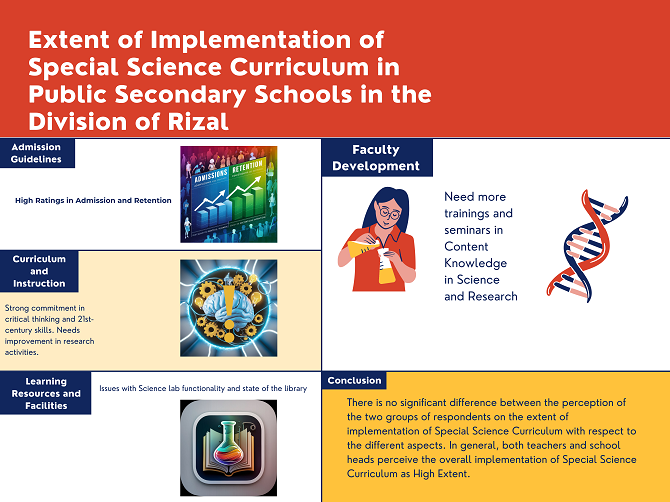
Extent of Implementation of Special Science Curriculum in Public Secondary Schools in the Division of Rizal
Abstract
The study determined the extent of the special science curriculum implementation in public secondary schools in the Division of Rizal for the school year 2022-2023. This research employed a descriptive survey design to determine the assessment of the teachers and school heads on the program's implementation. The findings revealed a commendable adherence to guidelines in admission and retention processes, garnering high ratings from respondents. However, the lower rating for student transfers from regular to SSC classes signals a need for enhancement. Regarding Curriculum and Instruction, there is a solid commitment to critical thinking and 21st-century skills; however, a lower rating for scientific research suggests a targeted need for improvement. For Learning Resources and Facilities, concerns arise regarding the science laboratory's functionality and the library's overall state.
Regarding Faculty Development, the mean is lower for providing opportunities for training and seminars on research and advanced subjects, suggesting a need for improvement. There is no significant difference between the perceptions of the two groups of respondents regarding the extent of implementation of the Special Science Curriculum in terms of the different aspects. In general, teachers and school heads perceive the overall implementation of the Special Science Curriculum as a High Extent.
Keywords
Full Text:
Download PDFReferences
Atchuela, C. V. (2019). The Extent of the Implementation of Special Science Curriculum: The Case of Maddela Comprehensive High School. Ascendens Asia Journal of Multidisciplinary Research Abstracts, 3(2M).
Amolins, M. W., Ezrailson, C. M., Pearce, D. A., Elliott, A. J., & Vitiello, P. F. (2015). Evaluating the effectiveness of a laboratory-based professional development program for science educators. Advances in physiology education, 39(4), 341-351.
Apendi, T. (2020). The library needs serious improvements to attract reading interest. Jurnal Pendidikan: Riset Dan Konseptual, 4(1), 48-55.
Bodur, N. C., Tuysuz, C., & Ugulu, I. (2022). Qualitative Evaluation of the Science Curriculum Applied in Science and Art Centers (SACs) for Gifted Students in Turkey Within the Framework of the CIPP Approach. Journal of Advanced Academics, 33(4), 604-635.
Boudersa, N. (2016). The importance of teachers' training programs and professional development in the Algerian educational context: Toward informed and effective teaching practices. Expériences Pédagogiques, 1(1), 1-14.
Calmorin, L. P. (2016). Research and thesis writing with statistics computer application. Manila: Rex Book Store.
Coll, R. K., & Taylor, N. (2012). An international perspective on science curriculum development and implementation. Second international handbook of science education, 771-782.
De La Cruz, R. J. D. (2022). Science education in the Philippines. In Science Education in Countries Along the Belt & Road: Future Insights and New Requirements (pp. 331-345). Singapore: Springer Nature Singapore.
Gale, J., Alemdar, M., Lingle, J., & Newton, S. (2020). Exploring critical components of an integrated STEM curriculum: an application of the innovation implementation framework. International Journal of STEM Education, 7, 1-17.
Gauchat, C. (2010). Effects of a novel science curriculum versus traditional science curriculum on problem solving skills and attitudes for 10th grade students. Trevecca Nazarene University.
Gouëdard, P., Pont, B., Hyttinen, S., & Huang, P. (2020). Curriculum reform: A literature review to support effective implementation.
Kapilan, N., & Vidhya, P. (2021). Role of Virtual Laboratories in Teaching Learning Processes of India. In IT and the Development of Digital Skills and Competences in Education (pp. 235-252). IGI Global.
Kimbark, K., Peters, M. L., & Richardson, T. (2017). Effectiveness of the student success course on persistence, retention, academic achievement, and student engagement. Community College Journal of Research and Practice, 41(2), 124-138.
Makoba, E. K., & Odhiambo, J. O. (2022). Science Education in Kenya. In Science Education in Countries Along the Belt & Road: Future Insights and New Requirements (pp. 67-81). Singapore: Springer Nature Singapore.
Nofzinger, A. (2022). Teacher Self-Efficacy and Science Beliefs with the Implementation of the NGSS into a High School Science Curriculum (Doctoral dissertation, Northeastern University).
Obi, M. N., & Okekeokosisi, J. O. (2018). Extent of implementation of national entrepreneurship curriculum in tertiary institutions as perceived by educators. American Journal of Education and Learning, 3(2), 108-115.
Penuel, W. R., Phillips, R., & Harris, C. (2014). Analysing teachers’ curriculum implementation from integrity and actor-oriented perspectives. Journal of Curriculum Studies, 46(6), 751–777. https://doi.org/10.1080/00220272.2014.921841
Ugulu, I. (2021). Quantitative research on gifted Students’ scientific epistemological beliefs. MIER Journal of Educational Studies Trends & Practices, 11(2), 252–268. https://doi. org/10.52634/mier/2021/v11/i2/1683
DOI: https://doi.org/10.17509/jsl.v7i2.68446
Refbacks
- There are currently no refbacks.
Copyright (c) 2024 Robert John De los Reyes De la Cruz

This work is licensed under a Creative Commons Attribution-ShareAlike 4.0 International License.


Jl. Dr. Setiabudhi 229 Bandung 40154, West Java, Indonesia











